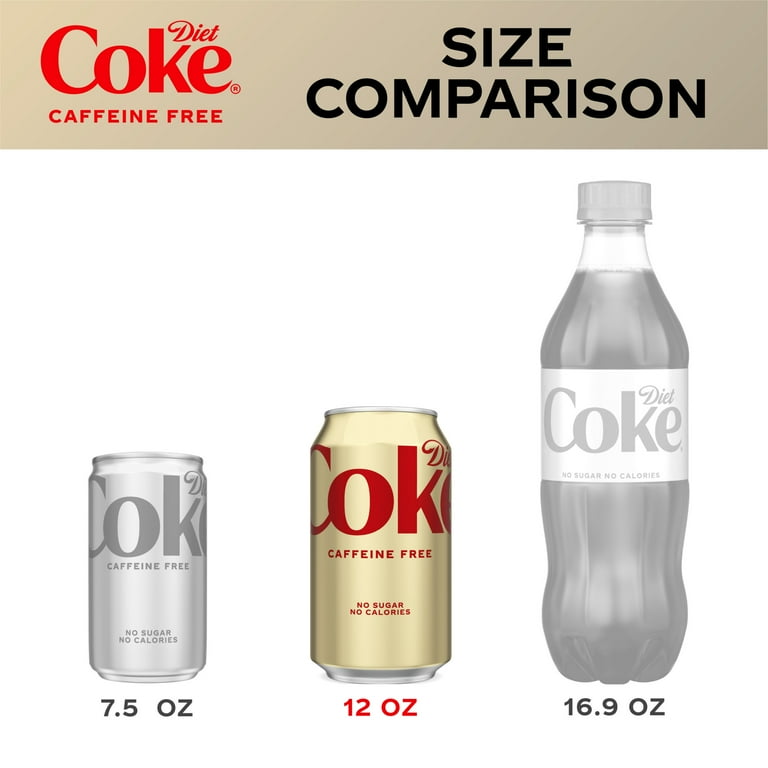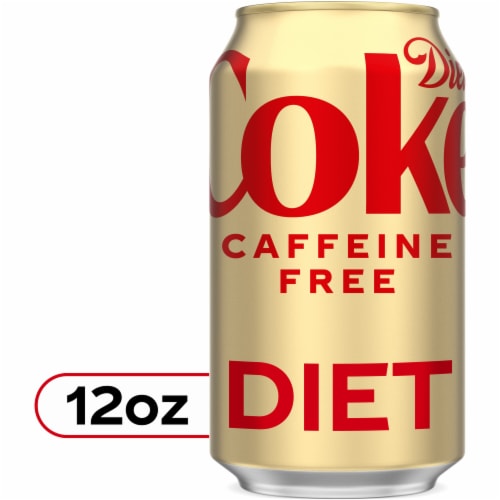A 12 oz can of Diet Coke contains about 46 milligrams of caffeine. This amount is less than a cup of coffee, but still enough to provide a mild energy boost.
Many people are curious about the caffeine content in their favorite drinks. Diet Coke, a popular choice among soda lovers, has been a subject of interest for its caffeine levels. Caffeine is a natural stimulant, and knowing how much is in your drink can help you manage your intake.
Whether you are sensitive to caffeine or just curious, understanding the caffeine content can be helpful. This blog will explore the specifics of how much caffeine is in a 12 oz can of Diet Coke and what that means for you.
Caffeine Content In Diet Coke
A 12 oz can of Diet Coke contains 46 milligrams of caffeine. This amount helps provide a mild energy boost. For comparison, a regular cup of coffee has about 95 milligrams.
Diet Coke is a popular choice for those who enjoy a fizzy drink without the calories. But many wonder about its caffeine content. Understanding this can help you make informed choices about your caffeine intake.Typical Caffeine Levels
A 12 oz can of Diet Coke contains about 46 milligrams of caffeine. This amount can vary slightly depending on the brand and location. But generally, 46 milligrams is the standard amount. For comparison, a cup of brewed coffee has around 95 milligrams of caffeine. So, Diet Coke has less caffeine than coffee.Comparison With Regular Coke
Regular Coke and Diet Coke have different caffeine levels. A 12 oz can of Regular Coke contains approximately 34 milligrams of caffeine. This is less than the 46 milligrams found in Diet Coke. So, if you prefer a higher caffeine content, Diet Coke is the better choice. This difference can be important for those watching their caffeine intake. Understanding these differences can help you choose the right beverage for your needs. Whether you drink Diet Coke for the taste or the caffeine, knowing its content is useful. “`
Credit: www.walmart.com
Diet Coke And Other Soft Drinks
Diet Coke is one of the most popular soft drinks worldwide. Many people choose it because of its refreshing taste and zero-calorie promise. But how much caffeine does it contain? And how does it compare to other soft drinks?
Pepsi Vs. Diet Coke
Both Pepsi and Diet Coke are popular choices for cola lovers. Each has its own unique taste and caffeine content.
| Drink | Caffeine (mg per 12 oz) |
|---|---|
| Diet Coke | 46 mg |
| Pepsi | 38 mg |
As you can see, Diet Coke has slightly more caffeine than Pepsi. This can make it a better option for those needing a small caffeine boost.
Other Popular Diet Sodas
There are many other diet sodas on the market. Each offers a different level of caffeine.
- Diet Pepsi: 35 mg per 12 oz
- Coke Zero: 34 mg per 12 oz
- Diet Dr Pepper: 41 mg per 12 oz
- Diet Mountain Dew: 54 mg per 12 oz
Among these, Diet Mountain Dew stands out with the highest caffeine content. For those who prefer less caffeine, Coke Zero or Diet Pepsi might be better choices.
Understanding the caffeine content in your favorite soft drink can help you make better choices. Whether you prefer Diet Coke or another diet soda, knowing the caffeine levels can guide your consumption.
Caffeine And Health
Caffeine is a natural stimulant found in various beverages, including Diet Coke. Understanding its effects on health is important. This section explores how caffeine affects the body and the recommended daily limits.
Effects On The Body
Caffeine impacts the body in several ways. It can increase alertness and reduce fatigue. Many people rely on it for a quick energy boost.
Negative Effects:
- Can cause jitteriness
- May lead to insomnia
- Increases heart rate
Recommended Daily Limits
The FDA suggests that up to 400 milligrams of caffeine per day is safe for most adults. This is roughly the amount in four 8-oz cups of coffee.
Drinking a 12 oz can of Diet Coke provides 46 mg of caffeine. You can safely consume multiple cans, but keep track of your total caffeine intake.

Credit: www.foodsco.net
Caffeine Measurement Methods
Understanding the caffeine content in beverages like Diet Coke is important. Different methods are used to measure caffeine. These methods help provide accurate information to consumers. Let’s explore some of these methods.
Lab Testing Procedures
Lab tests are the most accurate way to measure caffeine. Scientists use tools like High-Performance Liquid Chromatography (HPLC). This method separates caffeine from other components in the drink. HPLC provides precise measurements, ensuring we know exactly how much caffeine is present.
Another method is UV-Visible Spectroscopy. This technique measures the absorbance of light by caffeine molecules. Both of these methods are reliable and used widely in the industry.
Accuracy Of Labels
Labels on Diet Coke cans usually state the caffeine content. The FDA requires companies to provide accurate information. However, small variations can occur. These variations are often due to manufacturing differences.
Most labels list the caffeine content per serving size. For a 12 oz Diet Coke, the label typically shows around 46 milligrams of caffeine. This information is helpful for consumers monitoring their caffeine intake.
Despite the accuracy of lab tests, always consider slight variations. Real-world conditions can affect the final caffeine content. But generally, the label provides a good estimate.
Caffeine Myths
When discussing the caffeine content in Diet Coke, many myths arise. These myths often lead to confusion and misinformation. Let’s clear up some common misconceptions and debunk false claims about caffeine.
Common Misconceptions
Many believe Diet Coke has the same caffeine as regular Coke. This is not true. Diet Coke actually has more caffeine. Some think caffeine is harmful in any amount. This is a misconception. Moderate caffeine intake is generally safe for most people.
Debunking False Claims
One false claim is that Diet Coke has more caffeine than coffee. In reality, an average cup of coffee has more caffeine. Another myth is that caffeine causes dehydration. Studies show moderate caffeine does not dehydrate you.
People also believe caffeine stunts growth. No scientific evidence supports this claim. Understanding these myths helps make informed choices about caffeine consumption.

Credit: ftp.gardengrocer.com
Alternatives To Diet Coke
Many people enjoy Diet Coke for its taste and caffeine content. But some may look for alternatives. Whether you want to reduce caffeine or try something new, there are many options. Let’s explore some of these alternatives.
Caffeine-free Options
If you want to avoid caffeine, there are many choices. Caffeine-free sodas are popular. They offer the same taste without the caffeine. Ginger ale and lemon-lime sodas are good options. Root beer is another caffeine-free choice. These drinks provide a fizzy experience without the stimulant.
Herbal teas are also caffeine-free. They come in many flavors, from peppermint to chamomile. They can be enjoyed hot or cold. Decaffeinated coffee is another option. It offers the coffee taste without the caffeine jolt.
Natural Drink Choices
Natural drinks can be a healthy alternative to Diet Coke. Fresh fruit juices are a great option. They are packed with vitamins and taste delicious. Orange juice, apple juice, and grape juice are popular choices.
Another natural option is flavored water. You can make it at home with fruits and herbs. Try adding slices of lemon, cucumber, or mint to your water. This adds flavor without any artificial ingredients.
Coconut water is also a natural drink choice. It is hydrating and contains electrolytes. It’s a good option for a refreshing drink. Smoothies made from fresh fruits and vegetables can also be a healthy alternative. They provide nutrients and can be customized to your taste.
Reducing Caffeine Intake
Reducing caffeine intake can be challenging, especially for those who enjoy their daily beverages. Many people are surprised to learn how much caffeine is in 12 Oz of Diet Coke. With approximately 46 milligrams of caffeine in each can, it’s easy to consume more caffeine than intended. Reducing caffeine intake can lead to better sleep, less anxiety, and improved overall health. Here, we will discuss some practical tips to help you reduce your caffeine intake effectively.
Gradual Reduction Tips
Start by cutting back slowly. Instead of drinking a full can, try reducing the amount by a few ounces each day. This method helps your body adjust without causing withdrawal symptoms.
Track your caffeine consumption. Keep a journal of how much caffeine you drink each day. It will help you see your progress and stay motivated.
Mix caffeinated and non-caffeinated drinks. Diluting your Diet Coke with caffeine-free soda can help reduce your overall intake while still enjoying the taste.
Healthy Substitutes
Choose water. It’s the healthiest drink and keeps you hydrated without any caffeine.
Opt for herbal teas. Many herbal teas, like chamomile or peppermint, are caffeine-free and offer a soothing alternative.
Try decaf coffee or tea. These options provide the flavor without the stimulating effects of caffeine.
Consider sparkling water. It offers the fizz you love without any caffeine or added sugars.
Frequently Asked Questions
How Much Caffeine Is In 12 Oz Of Diet Coke?
A 12 oz can of Diet Coke contains approximately 46 mg of caffeine. This amount is relatively low compared to other caffeinated beverages.
Is Diet Coke Caffeine Content High?
Diet Coke’s caffeine content is not considered high. It has 46 mg per 12 oz, which is lower than many energy drinks and coffee.
How Does Diet Coke’s Caffeine Compare To Coffee?
A 12 oz Diet Coke has 46 mg of caffeine, while a typical cup of coffee has about 95 mg. Coffee generally has more caffeine.
Does Diet Coke Have More Caffeine Than Regular Coke?
Yes, Diet Coke has more caffeine than regular Coke. A 12 oz can of regular Coke contains about 34 mg of caffeine, compared to 46 mg in Diet Coke.
Conclusion
Understanding the caffeine content in Diet Coke is important for your health. A 12 oz can has about 46 mg of caffeine. This amount is less than coffee but still significant. Monitor your intake to avoid overconsumption. Remember, moderation is key for a balanced diet.
Keep informed, stay healthy, and enjoy your beverages wisely.